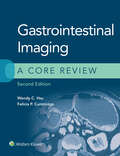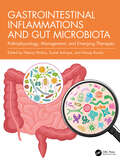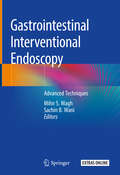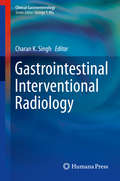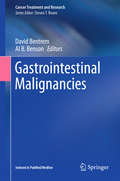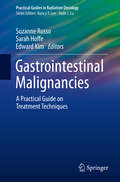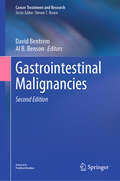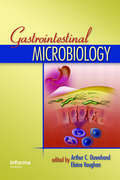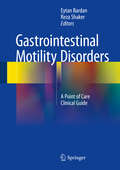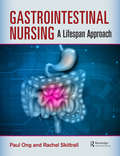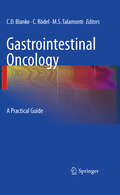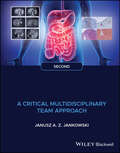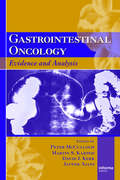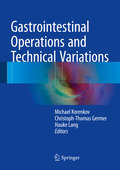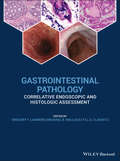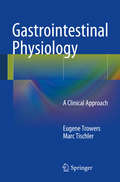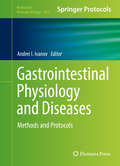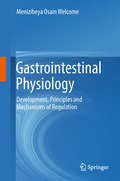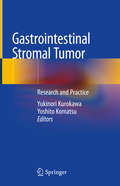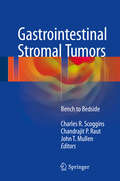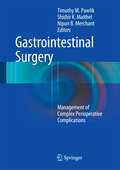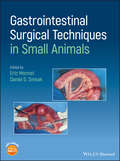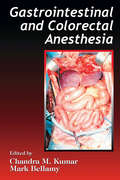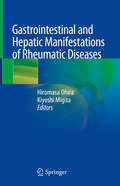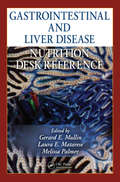- Table View
- List View
Gastrointestinal Imaging: A Core Review (A\core Review Ser.)
by Wendy C Hsu Felicia P CummingsPrepare for success on the gastrointestinal imaging component of the radiology Core Exam! Gastrointestinal Imaging: A Core Review, 2nd Edition, is an up-to-date, practical review tool written specifically for the Core Exam. This helpful resource covers the wide variety of organs and contains 300 image-rich, multiple-choice questions with detailed explanations of right and wrong answers, fully revised content, high-yield tables and figures for easy review, and additional eBook questions to ensure you’re ready for the Core Exam and Certifying Exam.
Gastrointestinal Inflammations and Gut Microbiota: Pathophysiology, Management, and Emerging Therapies
by Anoop Kumar Neeraj Mishra Sumel AshiqueThis book offers a comprehensive and multi-faceted examination of gastrointestinal inflammations, discussing factors that impact gut health. The initial chapters establish a foundational understanding of gastrointestinal inflammations and the critical role of the gut microbiota. The book then delves into the complex pathophysiology and various risk factors associated with these conditions, offering insights into the latest diagnostic, screening, and prevention techniques. It explores the dynamic interactions between the gut and the brain as well as the biochemical interplays involving short-chain fatty acids, reactive oxygen species, and superoxide dismutases. Additionally, the book thoroughly discusses the impact of genetics on gastrointestinal health, the interactions between antibiotics and gut microbiota, and the pivotal role of the immune system in inflammation. It highlights advancements in diagnostic technologies and gut microbiota-based strategies, along with the use of nanoparticles in treatment. The book also examines the psychological aspects associated with gastrointestinal inflammations, emphasizing the importance of mental health for physical well-being. It assesses the potential of functional foods, various types of nanocarriers, and plant-based bioactives in managing gastrointestinal inflammations. As such, this book is primarily intended for researchers and students in the fields of gastroenterology and microbiology.Key Features: Provides an extensive overview of gastrointestinal inflammations, starting from the basic concepts of the gut microbiota to complex pathophysiological aspects Delves into the latest advancements in diagnostic, screening, and prevention techniques, highlighting cutting-edge technologies and approaches in gastroenterology Explores the role of the immune system and the impact of genetics and diet on gastrointestinal health Examines use of probiotics, prebiotics, postbiotics, and various nanotechnology-based approaches for gastrointestinal inflammation management Emphasis on the psychological factors associated with gastrointestinal inflammations
Gastrointestinal Interventional Endoscopy: Advanced Techniques
by Mihir S. Wagh Sachin B. WaniThis volume provides a concise yet comprehensive overview of advanced techniques in interventional endoscopy beyond ERCP and EUS. Comprised of sections on endoscopic resection (including EMR, ESD, STER and EFTR), bariatric endoscopy, endoscopic myotomy (POEM, GPOEM, ZPOEM and PREM), endoscopic anti-reflux therapies, endoscopic tissue apposition, and advances in interventional EUS, the text highlights indications and technical details, assesses safety and efficacy, and provides quality metrics and training pathways for these endoscopic procedures. The book is also accompanied by multiple photos and videos illustrating these endoscopic techniques. Written by world renowned experts in the field, Gastrointestinal Interventional Endoscopy: Advanced Techniques is a valuable resource for gastroenterologists and surgeons interested in the latest advances in interventional endoscopy.
Gastrointestinal Interventional Radiology (Clinical Gastroenterology)
by Charan K. SinghThis volume provides a concise yet comprehensive overview of gastrointestinal interventional radiology (IR). The text reviews the extensive array of gastrointestinal IR procedures available, while illustrating the ways in which IR can help and how IR may be the only means available to treat patients. The book also focuses on common clinical issues surrounding IR procedures, including how to know which procedures are best for a patient, how to prepare patients for the procedure, and how to handle complications and decide on medications after the procedure. Written by experts in the field, Gastrointestinal Interventional Radiology is a valuable resource for clinicians and practitioners that will help improve overall patient clinical outcomes.
Gastrointestinal Malignancies
by David Bentrem Al B. BensonThis book comprehensively summarizes the current state of knowledge on malignancies of the gastrointestinal tract. Dedicated organ-based chapters evaluate current treatments and management and provide information on incidence, etiology and biological characteristics. The state of the art in the radiologic and endoscopic staging of gastrointestinal malignancies is described, and guidance is offered on the role of interventional radiology and interventional gastroenterology in the treatment of these challenging tumors. In addition, the book explores novel and evolving treatments, including personalized systemic therapy and minimally invasive surgical and radiology techniques, and addresses patient-reported outcomes and survivorship challenges. It closes by discussing animal models of gastrointestinal malignancies and examining the significance of the Ras superfamily of GTPases. It will be of benefit to all surgeons, oncologists and other specialists who treat these malignancies, as well as to trainees looking to increase their understanding of the field.
Gastrointestinal Malignancies
by Suzanne Russo Sarah Hoffe Edward KimThis book is a practical guide on how best to incorporate advanced radiation therapy techniques into the multimodality treatment of a wide range of gastrointestinal tumors, including esophageal cancer, gastric cancer, hepatobiliary malignancies (primary and metastatic liver tumors, intrahepatic, perihilar, and extrahepatic cholangiocarcinomas, and gallbladder cancer), pancreatic cancer, colorectal cancer, and carcinoma of the anal canal. Practical considerations when treating patients with external beam radiation therapy, intensity-modulated radiation therapy, particle therapy, and stereotactic body radiation therapy are clearly explained. Detailed attention is devoted to the safety and efficacy of radiotherapy in combination with current and emerging systemic therapies (chemotherapy, immunotherapy, and biologic agents), surgery, and ablative therapy, and the advantages and disadvantages of alternative treatment approaches for different tumor types are carefully evaluated. The book will benefit radiation oncologists, medical and surgical oncologists, medical physicists, medical dosimetrists, and other oncology professionals.
Gastrointestinal Malignancies (Cancer Treatment and Research #192)
by David Bentrem Al B. BensonThis book now published in its fully updated second edition comprehensively summarizes the current state of knowledge on malignancies of the gastrointestinal tract and highlights the latest efforts in multimodality treatment options before and after surgery, important ongoing trials as well as future areas of investigation. Dedicated organ-based chapters evaluate current treatments and management and provide information on incidence, etiology and biological characteristics. The state of the art in the radiologic and endoscopic staging of gastrointestinal malignancies is described, and guidance is offered on the role of interventional radiology and interventional gastroenterology in the treatment of these challenging tumors. In addition, the book explores novel and evolving treatments, including Immunotherapy, personalized systemic therapy and minimally invasive surgical and radiology techniques, and addresses patient-reported outcomes and survivorship challenges. It will be of benefit to all surgeons, oncologists and other specialists who treat these malignancies, as well as to trainees looking to increase their understanding of the field.
Gastrointestinal Microbiology
by Arthur C. OuwehandThis reference supplies a comprehensive and current overview of every aspect of gastrointestinal microbiota. Expertly written chapters cover conventional and molecular techniques for the study of differing microbial populations, as well as the analysis of microbial activity and interaction with host bodies. Illustrative and up-to-date, this source
Gastrointestinal Motility Disorders
by Reza Shaker Eytan BardanThis guide focuses on the answers to patient questions that are frequently posed to providers who care for patients with GI motility disorders. Additionally, the text guides clinicians through the complicated diagnostic and therapeutic/management approaches to motility disorders, including common and specialized tests, drug initiation, medications side effects, and disease complications. Written by experts in the field, Gastrointestinal Motility Disorders: A Point of Care Clinical Guide is a valuable reference for busy clinicians who need the best evidence-based answers to patient questions at their fingertips.
Gastrointestinal Nursing: A Lifespan Approach
by Paul Ong Rachel SkittrallDisorders of the gastrointestinal tract make up some of the most common illnesses experienced across the lifespan affecting individuals in infancy, childhood and adulthood. This essential guide to the gastrointestinal system will enable nurses and allied health professionals to apply principles of anatomy and physiology to clinical practice. Taking a practical and evidence-based approach, each chapter explores associated anatomy, function and abnormalities. Chapters use selected pathology and associated pathophysiology, from across the lifespan, to support understanding of how disorders can disrupt the development and function of the gastrointestinal tract. The accessible writing style and full colour illustrations make this an ideal introduction for students and professionals new to gastrointestinal care.
Gastrointestinal Oncology
by Claus Rödel Charles D. Blanke Mark S. TalamontiGastrointestinal Oncology is an evidence-based, practical reference intended to assist in the diagnosis and management of patients with gastrointestinal malignancies. It is designed to be as user friendly as possible and is distinguished by the extremely practical, concrete nature of the information presented and by the multidisciplinary approach adopted. In addition to disease-oriented chapters spanning sites from the esophagus to the anus, non-anatomic subjects such as modern imaging techniques are also addressed. Translational science is supplied where useful in the decision-making process. All of the authors are internationally recognized experts. This book is an ideal resource for oncologists, surgeons, gastroenterologists, and primary-care providers looking for the latest and best information on how to deal with a wide variety of gastrointestinal neoplasms.
Gastrointestinal Oncology: A Critical Multidisciplinary Team Approach
by Professor Janusz A. Z. Jankowski JPGASTROINTESTINAL ONCOLOGY Blends quality research findings with advanced educational techniques in a uniquely comprehensive approach Written and edited by leading international experts in the field, Gastrointestinal Oncology: A Critical Multidisciplinary Team Approach is an indispensable reference for clinicians, medical practitioners, and trainees involved in the investigation, diagnosis, and treatment of esophageal, gastric, intestinal, colonic, hepatobiliary, pancreatic, and other gastrointestinal tumors. Drawing on the most current evidence-based knowledge, this comprehensive resource reflects the current care of GI cancer patients, enabling effective clinical decision making and patient management. Setting the standard in clinical practice, Gastrointestinal Oncology remains the only truly multidisciplinary reference designed for the diverse team of clinicians responsible for different stages of cancer treatment. Specially structured clinical chapters, each representing a different role in the multidisciplinary team (MDT), allow clear presentation and quick reference of the contents. This is supported by a wealth of high-quality color photographs, line drawings, and diagrams. Now in its second edition, this authoritative reference is fully updated to reflect groundbreaking research in multiple medical fields, including the explorative use of A.I. New sections on palliative care and nutrition are accompanied by new sub-sections on molecular characterization, new targeted small molecule, receptor options, and immunological therapies for each cancer. This edition places renewed emphasis on the most ubiquitous conditions, such as colon cancer, liver cancer, and gastro-esophageal cancer. Covering the oncology of the entire gastrointestinal tract, Gastrointestinal Oncology: A Critical Multidisciplinary Team Approach is a must-have reference for the entire MDT, including gastroenterologists, hepatologists, GI surgeons, medical oncologists, radiation therapists, interventional radiologists, pathologists, nutritionists, palliative care and specialist nurses, as well as clinical scientists.
Gastrointestinal Oncology: Evidence and Analysis
by David J. Kerr Peter McCulloch Martin S. Karpeh Jaffer AjaniThis reference discusses best practices for the management of patients with cancers of the esophagus, stomach, colon, liver, and pancreas. Focusing on a wide variety of GI carcinomas by organ and tumor type, this source provides expert coverage of diagnostic, staging, and treatment procedures by seasoned oncologists and radiologists, and offers in-
Gastrointestinal Operations and Technical Variations
by Michael Korenkov Christoph-Thomas Germer Hauke LangIn this book, leading experts provide step-by-step, illustrated descriptions of their standard surgical techniques (open and laparoscopic) for diverse gastrointestinal indications and their preferred modifications when confronted by challenging circumstances associated with an increased risk of intra- or postoperative complications. The provision of several points of view for each surgical indication ensures that approaches from the conservative to the more radical are conveyed. It is clearly explained in which situations use of the described technical variations may be indicated, and practical tips are provided on the avoidance of complications. In addition, important medicolegal issues are discussed and guidance is offered on risk assessment and decision analysis within the surgical setting. The book will be an invaluable aid to decision making and practice for every gastrointestinal surgeon.
Gastrointestinal Pathology: Correlative Endoscopic and Histologic Assessment
by Till S. ClauditzAn illustrated guide to best practices when performing and assessing biopsies for GI conditions of all kinds Accurate diagnosis of GI conditions necessarily entails both the careful taking of biopsies and the informed analysis of tissue material. With that being so, gastroenterologists and GI pathologists alike must have a solid understanding of the techniques, handling requirements, and diagnostic characteristics involved if they are to collaborate effectively. Gastrointestinal Pathology has been designed to provide a clinically focussed and richly illustrated guide to real-world scenarios faced by practicing GI specialists, offering step-by-step instruction and professional advice on the correct diagnosis of all major GI conditions. This essential new book includes: Full-color illustrations throughout Complete details of biopsy samples required to diagnose specific conditions Reviews of differential diagnoses Clinical management clues based on pathologic findings Featuring information to improve the practice of all gastroenterologists and GI pathologists, Gastrointestinal Pathology is a practical and every-day resource for the precise diagnosis of a wide range of GI conditions.
Gastrointestinal Physiology
by Eugene Trowers Marc TischlerThis volume provides a practical hands on guide to gastrointestinal physiology. The book emphasizes an appreciation of basic physiological concepts and their application to novel clinical situations. It exposes the physician-in-training to fundamental principles that are useful in treating patients and lays the groundwork for more advanced study in the future. The authors present relevant cases which incorporate newer adult learning strategies in medical education These cases provide a forum in which the student can apply acquired knowledge, skills and attitudes Connections are made to reader's life, whether in the classroom, on the wards or out and about town. Designed for medical students who are studying gastrointestinal physiology for the first time, Gastrointestinal Physiology: A Clinical Approach provides a superb review for upper level medical students and house officers Nursing and allied health professions students will also find this text to be a useful guide GI fellows and attending physicians in need of a concise review of fundamental GI physiology principles will also benefit from reading this book
Gastrointestinal Physiology and Diseases
by Andrei I. IvanovThis volume provides a comprehensive collection of classical and cutting edge protocols and techniques to examine the normal development and physiological functions of the gastrointestinal system and to model the most common digestive diseases. The chapters focus on diverse research topicsincluding ex vivo systems to study gastrointestinal development and functions,in vivo imaging of the gastrointestinal tract, isolation and characterizationof intestinal immune cells, and animal models of gastrointestinal inflammationand cancer. The Gastrointestinal Physiology and Diseases: Methods andProtocols book targets wide audience of physiologists,cell and developmental biologists, immunologists, and physician-scientistsworking in the field of gastroenterology and beyond. Written in the highly successful Methods in Molecular Biology series format, chapters includeintroductions to their respective topics, lists of the necessary materials andreagents, step-by-step, readily reproducible laboratory protocols, and tips ontroubleshooting and avoiding known pitfalls. Highly practical and clearly written, Gastrointestinal Physiology andDiseases: Methods and Protocols will serve both seasoned researchers as well asnewcomers to the field and will providea unique resource and expert guidance to modern laboratory techniques developedfor examining normal functions and diseases of the gastrointestinal tract.
Gastrointestinal Physiology: Development, Principles and Mechanisms of Regulation
by Menizibeya Osain WelcomeThis book offers one of the most comprehensive reviews in the field of gastrointestinal (GI) physiology, guiding readers on a journey through the complete digestive tract, while also highlighting related organs and glandular systems. It is not solely limited to organ system physiology, and related disciplines like anatomy and histology, but also examines the molecular and cellular processes that keep the digestive system running. As such, the book provides extensive information on the molecular, cellular, tissue, organ, and system levels of functions in the GI system. Chapters on the roles of the gut as an endocrine, exocrine and neural organ, as well as its microbiome functions, broaden readers’ understanding of the multi-organ networks in the human body. To help illustrate the interconnections between the physiological concepts, principles and clinical presentations, it outlines clinical examples such as pathologies that link basic science with clinical practice in special “clinical correlates” sections. Covering both traditional and contemporary topics, it is a valuable resource for biomedical students, as well as healthcare and scientific professionals.
Gastrointestinal Stromal Tumor: Research and Practice
by Yukinori Kurokawa Yoshito KomatsuThis book provides a comprehensive and up-to-date overview of gastrointestinal stromal tumors (GISTs). GISTs represent the most common mesenchymal neoplasms arising within the gastrointestinal tract. The causative gene of this disease was originally discovered in Japan by Prof. Seichi Hirota in 1998, and since then numerous important advances – from basic to clinical aspects – have been reported from Japan. Professionals involved in the management of GISTs inevitably cite significant evidence and the state-of-the-art treatments from the Asian region, where has there is and inherently high prevalence of gastrointestinal cancers. Each expert author elucidates the cutting-edge knowledge on pathophysiology, diagnosis, and treatment of GISTs, especially focusing on the highly valuable data from Japan. This attractive collection benefits not only oncologists but also basic researchers, general physicians and surgeons, as well as paramedical staff and medical students who are dealing with GISTs.
Gastrointestinal Stromal Tumors
by Charles R. Scoggins Chandrajit P. Raut John T. MullenThis textbook provides a comprehensive, state of the art review of this field, and will serve as a valuable resource for clinicians, surgeons and researchers with an interest in GIST. The book reviews new data about risk factors for the disease, profiles the new staging system for GIST, highlights our current understanding of genetic mutations that lead to GIST, and provides new perspectives about imaging of GIST tumors. For localized disease, a greater appreciation of organ-sparing approaches and the importance of preservation of gastrointestinal function is discussed in detail, and advances in surgical techniques are highlighted, including minimally invasive surgery. For metastatic disease, the molecular biology of GIST is reviewed in a detailed and understandable manner, including the data that has fostered novel targeted approaches that have revolutionized management. Several landmark trials have been published in the last few years and are placed in context with respect to current management. Integration of surgery and systemic therapy through consolidative approaches has yielded provocative data that promises to further advance the field, and major advances in this domain are also discussed. Gastrointestinal Stromal Tumors: Bench to Bedside will serve as a very useful resource for physicians and researchers dealing with, and interested in, this challenging malignancy. It provides a concise yet comprehensive summary of the current status of the field that will help guide patient management and stimulate investigative efforts. All chapters are written by experts in their fields and include the most up to date scientific and clinical information.
Gastrointestinal Surgery
by Timothy M. Pawlik Shishir K. Maithel Nipun B. MerchantAdvances in surgical technique and broadening indications for complex gastrointestinal procedures, surgical management of thoracic, hepato-pancreato-biliary, and colorectal diseases continues to evolve, but morbidity continues to be a persistent problem. This book provides a comprehensive, state-of-the art, definitive reference for the diagnosis and management of difficult-to-manage complications following advanced gastrointestinal surgery. All chapters are written by experts in their field and include the most up-to-date clinical information from national and world leaders in their respective discipline. The text provides a practical, clinically useful guide that reviews risk factors for these complications and offers key information on how to avoid potentially high morbidity events in the peri-operative period. It also discusses the management of these problems when they do occur. With its helpful guidelines and "tricks of the trade" to avoid potential complications, this book is essential to all medical professions treating such patients. Gastrointestinal Surgery: Management of Complex Perioperative Complications is of great value and utility for general surgeons, thoracic surgeons, upper gastrointestinal surgeons, colorectal surgeons, hepato-pancreato-biliary surgeons, surgical oncology fellows, thoracic surgery fellows and upper level residents in general surgery.
Gastrointestinal Surgical Techniques in Small Animals
by Eric Monnet Daniel D. SmeakGastrointestinal Surgical Techniques in Small Animals offers a highly detailed reference to surgical procedures in the gastrointestinal tract in dogs and cats. Each chapter describes the surgical techniques in depth, featuring high-quality illustrations depicting each step, and discusses tips and tricks for a successful surgery and potential complications. A companion website offers video clips demonstrating the procedures. Logically divided into sections by anatomy, each chapter covers indications, contraindications, and decision making for a specific surgery. Tips and tricks and potential complications are also covered. Describes techniques for canine and feline gastrointestinal surgery in detail Presents the state of the art for GI surgery in dogs and cats Includes access to a companion website with video clips demonstrating techniques Gastrointestinal Surgical Techniques in Small Animals is an essential resource for small animal surgeons and veterinary residents.
Gastrointestinal and Colorectal Anesthesia
by Chandra M. Kumar Mark BellamyThis resource stands as the only authoritative text to specifically focus on developments and best practices in anesthesiology for procedures affecting the gastrointestinal tract and related appendages. This book provides in-depth coverage of topics such as risk assessment, stress response, and scoring, as well as spans anesthetic trends and practi
Gastrointestinal and Hepatic Manifestations of Rheumatic Diseases
by Hiromasa Ohira Kiyoshi MigitaThis book presents research outcomes, providing a big picture of rheumatic diseases as systemic conditions, and exploring the correlation between liver dysfunction and gastrointestinal lesions. Each chapter presents the association between major rheumatic diseases and hepato-gastrointestinal lesions, including liver and gastrointestinal involvement in lupus erythematosus, dermatomyositis, systemic sclerosis, Bechet’s disease, and IgG4-related disease. The chapters on PBC-CREST syndrome and immunosuppressive agents broaden readers understanding and enable them to view the diseases from a systematic perspective. Although the disease is rare, it has attracted considerable attention as an intractable disease, and despite the severity of the symptoms, little has been written on the topic. Adopting a multidisciplinary approach, this comprehensive volume thoroughly prepares readers for research in the field of systemic diseases.Gastrointestinal and Hepatic Manifestations of Rheumatic Diseases is a valuable resource not only for hepatologists and rheumatologists, but also clinical residents and medical students.
Gastrointestinal and Liver Disease Nutrition Desk Reference
by Paul C. H. LiWhile the gastrointestinal tract ingests, digests, and absorbs nutrients, the liver transforms nutrients, synthesizes plasma proteins, and detoxifies bacteria and toxins absorbed from the gut. It is therefore not surprising that gastrointestinal and hepatic diseases have a major impact on the nutritional state of the individual. Integrating nutriti
